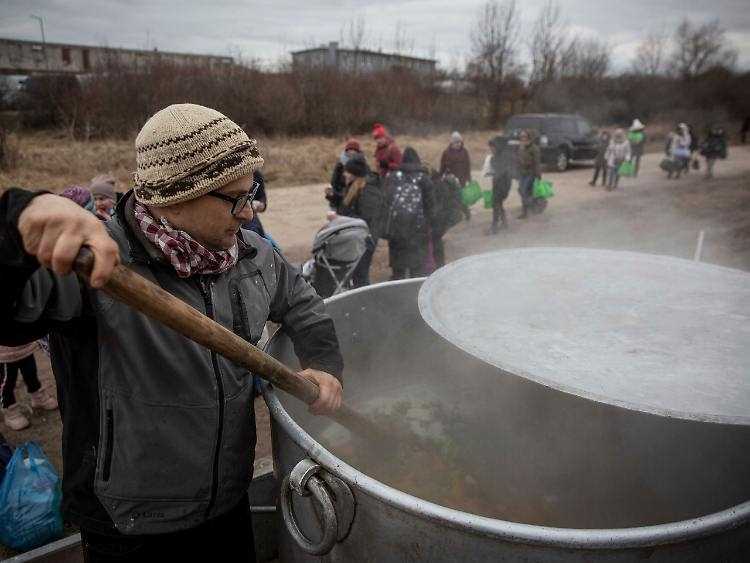Ukrainians more welcome than Syrians?
Eastern “refugee refusers” become helpers
03/16/2022, 08:39 am
Millions of people fled Ukraine before the war, many of them to Poland, the Czech Republic, Romania, Slovakia or Hungary. There, among the former quota opponents, the refugees find a great willingness to help. That surprises many. What has changed?
The Russian war against Ukraine has triggered a huge wave of solidarity in Poland, the Czech Republic, Slovakia and other eastern EU countries. People fleeing the fighting are welcomed with open arms and hearts. At the Polish border station in Przemysl, they first get something warm to eat. The Czech Republic sends special trains to deliver relief supplies and pick up refugees. Even small Slovakia already has more than 200,000 border crossings from Ukraine.
These are the same countries that made a name for themselves as “refugee refusers” during the migration crisis of 2015 and 2016. The Visegrad states of Poland, Slovakia, the Czech Republic and Hungary vehemently opposed a redistribution of the new arrivals among all EU states. The dispute even ended up before the European Court of Justice, which in April 2020 certified that the most stubborn objectors to admission had broken the law.
“Islamophobia is very big in Poland”
Poland, Medyka: A volunteer plays the piano for refugees at the border.
(Photo: picture alliance/dpa/SOPA Images via ZUMA Press Wire)
Why is everything different this time? “Islamophobia is very high in Poland, and refugees from Ukraine are closer to the people in terms of religion and culture than those from Syria,” says Warsaw-based political scientist Antoni Dudek. A second motive is sympathy for the victims of Russian aggression. “The Poles have a long tradition of uprisings against Russia.” The struggle of the Solidarnosc trade union, which overthrew the communist regime in the 1980s, is also interpreted by many Poles as resistance against Russian imperialism.
The situation is similar in the Czech Republic and Slovakia, where memories of the bloody suppression of the Prague Spring democracy movement in August 1968 are awakened. “There are many people who say that we made a mistake when we didn’t defend ourselves,” says Prague sociologist Jan Herzmann. The struggle of the Ukrainians for their country therefore arouses admiration.
Positive experiences with Ukrainian immigrants
According to the expert, another aspect is that positive experiences have been made with Ukrainian immigrants over the past few decades. Even before the war they were the largest group of foreigners in the Czech Republic. “The people work for us, they are efficient, they are decent,” says Herzmann. Poland has also long been a destination for Ukrainian migrant workers, who find employment in construction and agriculture.
Even Hungary, which in the end sealed itself off completely from those seeking protection from the Middle East and Asia in 2015, is keeping its gates wide open to Ukrainians. However, the vast majority of them move on to another European country, mostly to where relatives and friends already live and work. According to the police, more than 250,000 war refugees have come to Hungary so far.

Volunteer Lukas Saranga from the Czech Republic cooks soup for refugees who fled Ukraine in Medyka, Poland.
(Photo: picture alliance/dpa/AP)
“We don’t just help others, we help ourselves too, because that’s how we deal with our own fears,” says psychiatrist Jan Vevera from the University Hospital in Pilsen, Czech Republic. But he warns of an inevitable phase of disillusionment, in which disappointment spreads and conspiracy theories find a breeding ground.
“We have to reckon with the fact that the refugees will not behave exactly as we imagine,” says the 51-year-old. Many are likely to be frustrated by their situation. They are then tense and easily irritable. Women also worried about their husbands who stayed in Ukraine. Some would make claims instead of just showing gratitude. “We have to be prepared for that,” warns Vevera.
Opportunity for permanent redistribution quotas?
Is this now the chance to push through permanent redistribution quotas for refugees within the EU? Many experts deny that. “Even the term quotas is poisonous,” emphasizes sociologist Herzmann in view of the widespread skepticism about the EU. Political scientist Lukas Jelinek doesn’t expect any rethinking in Prague, Warsaw or Budapest either: “The Visegrad states will argue for a very long time that they have helped many Ukrainians and that there is therefore no capacity for migrants from other parts of the world.”
Sociologist Michal Vasecka from Bratislava explains that people who are perceived as foreign are easily rejected in a very traditional society, such as Slovakia’s, which is heavily influenced by Christianity. “It doesn’t just have to apply to foreigners, but can affect anyone who is different in other respects or thinks differently and is therefore perceived as a stranger,” says the 49-year-old.
Romania also welcomes with open arms
Even if Romania does not belong to the Central European Visegrad Group, it declared during the 2015 migration crisis that it could not take in more than 1,700 refugees. But now Ukrainians are being welcomed with open arms by authorities and countless private individuals. Here, too, Russia’s threatening image, which has existed for centuries, is decisive.
During World War II, Romania lost territory to what was then the Soviet Union, including what is now Moldova. Russophobia went so far that dictator Nicolae Ceausescu even publicly criticized the Soviet invasion of Prague in 1968 and distanced himself from Moscow – and remained so throughout his life.
